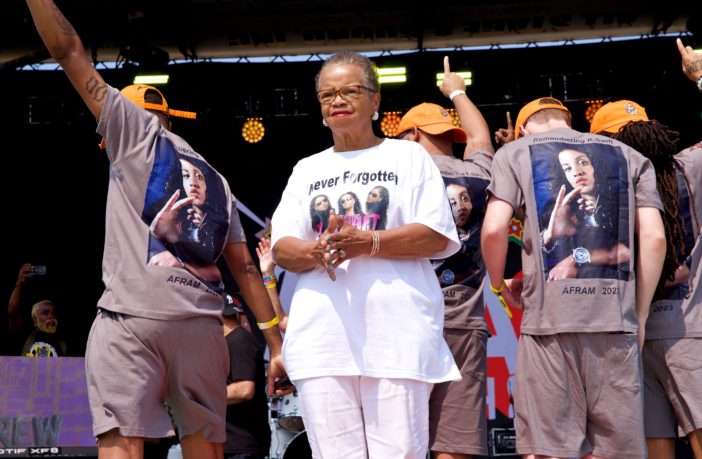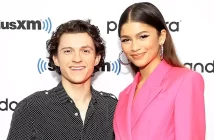By Stephanie Harper
Special to the AFRO
Summer doesn’t officially start in Baltimore until the AFRAM Festival kicks off, bringing residents and visitors from the entire region to enjoy all things related to African-American culture.
The 46th annual AFRAM festival is currently taking place, celebrating today’s hottest artists, Black culture and Black businesses. This year, the festival kicked off by officially marking June 17th as Baltimore Club Music Day. The two-day festival will continue through Sunday, June 18th, with the celebration coming to a close on Father’s Day.
This year, Baltimore’s AFRAM Festival hosted a number of amenities that were not offered last year. Including charging stations, water stations and a new option: a shuttle from Mondawmin Mall to the inside of the park.
The shuttle certainly helps with transportation, parking and the walk to the main stage, which could average a mile for most visitors. The main walk was covered with vendors serving everything from food, drinks, clothes, jewelry, soap to art work, health screenings and paraphernalia from local high schools and historically Black colleges and institutions (HBCUs).
The first day of the festival was jam packed with community, culture and of course the thumping bass of Baltimore club music.
The inaugural Baltimore Club Music Day was honored with a plaque and remarks from Mayor Brandon Scott who, alongside popular DJ Angel Baby, presented awards to legendary club music icons such as DJ Boogie, DJ BlacStar, Ducky Dynamo, and DJ Big L.
AFRO File Photo/ Reuben Greene
Mayor Brandon M. Scott and DJ Angel Baby speak to members of the AFRAM audience, in attendance for the inaugural Baltimore Club Music Day, recognized June 17. Credit: AFRO File Photo/ Reuben Greene
“Club music is the life blood of Baltimore,” Mayor Brandon M. Scott told the AFRO in an interview after leaving the stage.
“This is how we got our frustration out— this is how we got our pain out,” said Scott, referring to the high energy nature of both Baltimore club mix and the internationally known dances that go with it— like the “crazy legs,” the “SpongeBob” and the “Cherry Hill.”
Awards were handed out to those that have been a part of the Baltimore Club music scene pushing its history forward. Producers such as Mighty Mark and TT the Artist were among those that were recognized for their contributions to the sound of Baltimore Club Music.
Baltimore club music is not to be mistaken for mixes heard in Jersey or on the Philly music scene—which some say is a spin off of Charm City’s creation—differentiated by a faster beat with emphasis on slightly different percussion patterns.
To further celebrate the official recognition of Baltimore Club Music Day, participants of the festival received free “Baltimore Club Music Day” T-shirts to wear. The black and gold design could be seen on attendees of all ages and race, as dance battles and cyphers formed across a field full of residents rocking to the legendary sounds of DJ Big L.
For those not a fan of club mix, the festival offered a smaller stage which hosted neo-soul and local artists.
Still, day one of the AFRAM festival was focused on highlighting the dancers and music that makes Baltimore unique. The performances of professional performers “TSU Terry” Wedington and the now internationally known dancer, Bunkey Jr., did much more than just make appearances— they truly bonded with members of the crowd through the art of dance.
Wedington showed up with his crew, Team Squad Up (TSU), and made every song a hit with his explosive dance style.
“This means a lot now,” Wedington said, speaking on Baltimore Club Music Day and the world-wide recognition recently received after the drop of Netflix’s “Dark City: Beneath the Beat,” which explores the origins of Baltimore club music.
“I can relax now,” he told the AFRO. “The city is loving the actual culture of it again. I think when K-Swift passed there was this silence. Dancers like me tried to keep it going through dance— though we actual producers that make the music. We use the music that was before our time to showcase the dance moves and the dance music.”
Khia “K-Swift” Edgerton was a force to be reckoned with on the Baltimore music scene. She tragically died in July 2008 after diving into a pool at a party and sustaining fatal injuries. Baltimore Club Music Day included multiple mentions of K-Swift by the DJs and dancers who keep her memory alive.
Another member of TSU, known as Sheldon “TSU Rum” Mackall, weighed in on why Baltimore Club Music Day is so important to him.
“It keeps the history, and this is something Baltimore needed,” said Mackall. “Baltimore club started as an underground thing—hip hop is more industry. We actually had to work our way to be validated as a style and a culture and now we’re there.”
Though many legends were honored, viral sensation, Rodney Snead aka “Bunkey Jr.,” stole the show as the creator of the Park Heights Strut. Snead was in attendance and gave an exciting performance to commemorate the inaugural Baltimore Club Mix Day.
“Baltimore has always been popping and it’s just now being recognized— but we’ve always been us,” said Snead. “It’s our passion and our style that makes us stand out. We’ve always stood out and now it’s just the world is catching up with us.”
Baltimore club music trendsetter and legend DDM performed a tribute to Ms. Toni, a Baltimore club mix legend.
“Baltimore club music is important because it’s the signature and the pulse of the city,” DDM told the AFRO. “It has paved the way for some of the greatest hits and makes waves around the globe. I’m happy to be able to pay tribute to Ms. Toni today, a legendary Baltimore club music artist that opened up my eyes to club music. We are the culture that the world has been eyeing and now we’re officially global and here to stay.”



